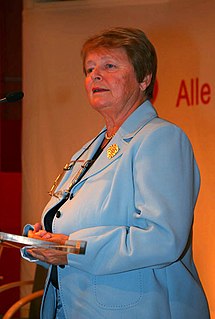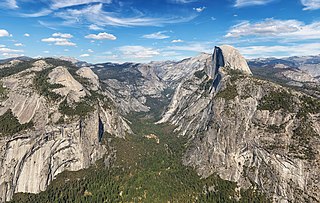
Sustainable development is an organizing principle for meeting human development goals while also sustaining the ability of natural systems to provide the natural resources and ecosystem services on which the economy and society depend. The desired result is a state of society where living conditions and resources are used to continue to meet human needs without undermining the integrity and stability of the natural system. Sustainable development was defined in the 1987 Brundtland Report as "development that meets the needs of the present generation without compromising the ability of future generations to meet their own needs". As the concept of sustainable development developed, it has shifted its focus more towards the economic development, social development and environmental protection for future generations.
Appropriate technology is a movement encompassing technological choice and application that is small-scale, affordable by locals, decentralized, labor-intensive, energy-efficient, environmentally sustainable, and locally autonomous. It was originally articulated as intermediate technology by the economist Ernst Friedrich "Fritz" Schumacher in his work Small Is Beautiful. Both Schumacher and many modern-day proponents of appropriate technology also emphasize the technology as people-centered.

Trade justice is a campaign by non-governmental organisations, plus efforts by other actors, to change the rules and practices of world trade in order to promote fairness. These organizations include consumer groups, trade unions, faith groups, aid agencies and environmental groups.

The Brundtland Commission, formerly the World Commission on Environment and Development, was a sub-organization of the United Nations (UN) that aimed to unite countries in pursuit of sustainable development. It was founded in 1983 when Javier Pérez de Cuéllar, the Secretary-General of the United Nations, appointed Gro Harlem Brundtland, former Prime Minister of Norway, as chairperson of the commission. Brundtland was chosen due to her strong background in the sciences and public health.
Eco-capitalism, also known as environmental capitalism or (sometimes) green capitalism, is the view that capital exists in nature as "natural capital" on which all wealth depends. Therefore, governments should use market-based policy-instruments to resolve environmental problems.
As countries and regions around the world began to develop, it slowly became evident that industrialization and economic growth come hand in hand with environmental degradation. Eco-efficiency has been proposed as one of the main tools to promote a transformation from unsustainable development to one of sustainable development. It is based on the concept of creating more goods and services while using fewer resources and creating less waste and pollution. "It is measured as the ratio between the (added) value of what has been produced and the (added) environment impacts of the product or service ." The term was coined by the World Business Council for Sustainable Development (WBCSD) in its 1992 publication "Changing Course," and at the 1992 Earth Summit, eco-efficiency was endorsed as a new business concept and means for companies to implement Agenda 21 in the private sector. Ergo the term has become synonymous with a management philosophy geared towards sustainability, combining ecological and economic efficiency.
A green economy is an economy that aims at reducing environmental risks and ecological scarcities, and that aims for sustainable development without degrading the environment. It is closely related with ecological economics, but has a more politically applied focus. The 2011 UNEP Green Economy Report argues "that to be green, an economy must not only be efficient, but also fair. Fairness implies recognizing global and country level equity dimensions, particularly in assuring a Just Transition to an economy that is low-carbon, resource efficient, and socially inclusive."

Environmental technology (envirotech) or green technology (greentech), also known as clean technology (cleantech), is the application of one or more of environmental science, green chemistry, environmental monitoring and electronic devices to monitor, model and conserve the natural environment and resources, and to curb the negative impacts of human involvement. The term is also used to describe sustainable energy generation technologies such as photovoltaics, wind turbines, etc. Sustainable development is the core of environmental technologies. The term environmental technologies is also used to describe a class of electronic devices that can promote sustainable management of resources.

Environmental goods are typically non-market goods, including clean air, clean water, landscape, green transport infrastructure, public parks, urban parks, rivers, mountains, forests, and beaches. Environmental goods are a sub-category of public goods. Concerns with environmental goods focus on the effects that the exploitation of ecological systems have on the economy, the well-being of humans and other species, and on the environment. Users not having to pay an upfront cost and external factors like pollution that can damage environmental goods indefinitely are some of the challenges in protecting environmental goods.
Bright green environmentalism is an ideology based on the belief that the convergence of technological change and social innovation provides the most successful path to sustainable development.
Factor Ten is a social and economic policy program developed by the Factor Ten institute with the stated goal of "provid[ing] practical support for achieving significant advances in sustainable value creation, in particular through increases in resource productivity throughout the economy.

An environmental enterprise is an environmentally friendly/compatible business. Specifically, an environmental enterprise is a business that produces value in the same manner which an ecosystem does, neither producing waste nor consuming unsustainable resources. In addition, an environmental enterprise rather finds alternative ways to produce one's products instead of taking advantage of animals for the sake of human profits. To be closer to the goal of being an environmentally friendly company, some environmental enterprises invest their money to develop or improve their technologies which are also environmentally friendly. In addition, environmental enterprises usually try to reduce global warming, so some companies use materials that are environmentally friendly to build their stores. They also set in place regulations that are environmentally friendly. All these efforts of the environmental enterprises can bring positive effects both for nature and people. The concept is rooted in the well-enumerated theories of natural capital, the eco-economy and cradle to cradle design. Examples of environmental enterprise would be Seventh Generation, Inc., and Whole Foods.

Sustainability is a societal goal that broadly aims for humans to safely co-exist on planet Earth over a long time. Specific definitions of sustainability are difficult to agree on and therefore vary in the literature and over time. This concept can be used to guide decisions at the global, national and individual level. In everyday usage of the term, sustainability is often focused on the environmental aspects. The most dominant environmental issues since around 2000 have been climate change, loss of biodiversity, loss of ecosystem services, land degradation, and air and water pollution. Humanity is now exceeding several "planetary boundaries".
Environmentally sustainable design is the philosophy of designing physical objects, the built environment, and services to comply with the principles of ecological sustainability and also aimed at improving the health and comfortability of occupants in a building. Sustainable design seeks to reduce negative impacts on the environment, the health and well-being of building occupants, thereby improving building performance. The basic objectives of sustainability are to reduce the consumption of non-renewable resources, minimize waste, and create healthy, productive environments.
In economic and environmental fields, decoupling refers to an economy that would be able to grow without corresponding increases in environmental pressure. In many economies, increasing production (GDP) currently raises pressure on the environment. An economy that would be able to sustain economic growth while reducing the amount of resources such as water or fossil fuels used and delink environmental deterioration at the same time would be said to be decoupled. Environmental pressure is often measured using emissions of pollutants, and decoupling is often measured by the emission intensity of economic output. Examples of absolute long-term decoupling are rare, but recently some industrialized countries have decoupled GDP growth from both production- and, to a lesser extent, consumption-based CO2 emissions.
Sustainable capitalism is a conceptual form of capitalism based upon sustainable practices that seek to preserve humanity and the planet, while reducing externalities and bearing a resemblance of capitalist economic policy. A capitalistic economy must expand to survive and find new markets to support this expansion. Capitalist systems are often destructive to the environment as well as certain individuals without access to proper representation. However, sustainability provides quite the opposite; it implies not only a continuation, but a replenishing of resources. Sustainability is often thought of to be related to environmentalism, and sustainable capitalism applies sustainable principles to economic governance and social aspects of capitalism as well.
Ecopreneurship is a term coined to represent the process of principles of entrepreneurship being applied to create businesses that solve environmental problems or operate sustainably. The term began to be widely used in the 1990s, and it is otherwise referred to as "environmental entrepreneurship." In the book Merging Economic and Environmental Concerns Through Ecopreneurship, written by Gwyn Schuyler in 1998, ecopreneurs are defined as follows:
"Ecopreneurs are entrepreneurs whose business efforts are not only driven by profit, but also by a concern for the environment. Ecopreneurship, also known as environmental entrepreneurship and eco-capitalism, is becoming more widespread as a new market-based approach to identifying opportunities for improving environmental quality and capitalizing upon them in the private sector for profit. "
Precise definitions of sustainable construction vary from place to place, and are constantly evolving to encompass varying approaches and priorities. In the United States, the Environmental Protection Agency (EPA) defines sustainable construction as "the practice of creating structures and using processes that are environmentally responsible and resource-efficient throughout a building's life-cycle from siting to design, construction, operation, maintenance, renovation and deconstruction." The Netherlands defines sustainable construction as "a way of building which aims at reducing (negative) health and environmental impacts caused by the construction process or by buildings or by the built-up environment." More comprehensively, sustainability can be considered from three dimension of planet, people and profit across the entire construction supply chain. Key concepts include the protection of the natural environment, choice of non-toxic materials, reduction and reuse of resources, waste minimization, and the use of life-cycle cost analysis.
Pro-environmental behaviour is behaviour that a person consciously chooses in order to minimize the negative impact of their actions on the environment. Barriers to pro-environmental behaviour are the numerous factors that hinder individuals when they try to adjust their behaviours toward living more sustainable lifestyles. Generally, these barriers can be separated into larger categories: psychological, social/cultural, financial and structural. Psychological barriers are considered internal, where an individuals' knowledge, beliefs and thoughts affect their behaviour. Social and cultural barriers are contextual, where an individual's behaviour is affected by their surroundings. Financial barriers are simply a lack of funds to move toward more sustainable behaviour. Structural barriers are external and often impossible for an individual to control, such as lack of governmental action, or locality of residence that promotes car use as opposed to public transit.
Solarpunk is a science fiction literary subgenre and art movement that envisions how the future might look if humanity succeeded in solving major contemporary challenges with an emphasis on sustainability, human impact on the environment, and addressing climate change and pollution. Especially as a subgenre, it is aligned with cyberpunk derivatives, and may borrow elements from utopian and fantasy genres.






